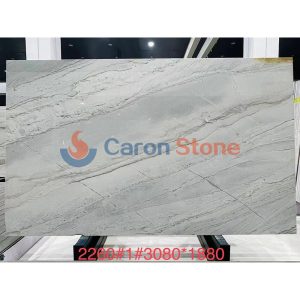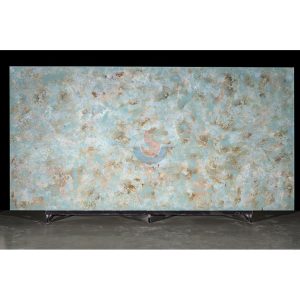In today’s diverse home improvement market, choosing the right kitchen countertop material has become a challenge. From traditional artificial stone to modern stainless steel, to natural marble and wood, each material has its own unique advantages and disadvantages. This article will explore the characteristics of these materials in depth, and guide you on how to choose the most suitable countertop for your kitchen according to actual needs, ensuring that it is both beautiful and practical.

Customized Calacatta do brasil quartzite stone slab for kitchen countertops from china
Unlike the past, when a piece of artificial stone was enough to solve the problem, there are too many kitchen countertop materials on the market now. In addition to various artificial stones, stainless steel commonly used in restaurants has also entered the home. There are also patterned marble, cement with industrial style, fresh wood and even some families use floor tiles to make kitchen countertops.
Choose artificial stone first
There are more pitfalls with more kitchen countertops
Stainless steel countertops look bright, but they are very easy to be scratched. The pots and pans in the kitchen will be scratched after one year of use. Moreover, stainless steel is easy to deform when exposed to heat, and it is common to have warped edges or bulges.
The only advantage of marble is that it looks good. You can think of it as Lin Daiyu in the stone industry. It is good to hang it on the wall as a decoration. If it is used on the countertop, it will change color when it touches water and will crack when touched.
Solid wood is OK for Western kitchens. Chinese kitchens use a lot of oil and fire. In addition to the trouble of oil pollution, high temperature and frequent contact with water will cause wood to crack.
Cement is very rough, but it is very heavy and cabinets may not be able to withstand it, and stains will penetrate into the countertop.
The use of tiles can only be said to be very avant-garde, or it may be that the workers and masters have cheated them. Anyway, tiles must not be put on the countertops.
These are not easy to use, so what should I choose? The most useful and cost-effective is ordinary artificial stone. For kitchen countertop materials with practical functions, artificiality does not mean inferior imitation, but allows the countertop to have more functions to deal with various problems.
Acrylic
The first generation of artificial stone, destroyed by itself
All artificially made stones belong to artificial stones, but generally people mention artificial stones, which are traditional acrylic artificial stones. This kind of artificial stone is made of acrylic resin and aluminum hydroxide, and was also called aluminum powder artificial stone in the early days.
The main feature of acrylic artificial stone is that it is more resistant to acid and alkali corrosion than natural stone. The surface of the material is smooth and non-porous, easy to maintain, very suitable for use in the kitchen, and acrylic feels relatively warm and will not be cold in winter.
More importantly, acrylic resin is not very hard and is easy to cut. It can be made into a seamless stone for all kinds of special-shaped kitchen countertops or islands. You can even make the kitchen sink and countertop into one piece to eliminate all dead corners.
Although it is not easy to crack, it is easy to scratch it with a knife because of its average hardness. In fact, acrylic is a very expensive resin material, so when choosing acrylic artificial stone, you should pay attention to the acrylic content. Generally, more than 40% is a high-quality material, which can guarantee a longer life as a kitchen countertop.
If you choose acrylic artificial stone, DuPont Corian from the United States is recommended. At that time, acrylic artificial stone was very popular. In order to make money, some unscrupulous manufacturers replaced aluminum hydroxide with calcium carbonate and reduced the content of acrylic resin.
Calcium carbonate is a brittle material. It can be corroded by weak acids or weak alkalis, and it is easy to crack and deform. Anyway, it is a material that is not practical at all, just like marble. This “adulteration” behavior caused the reputation of artificial stone to decline rapidly, and even changed people’s perception that artificial stone is inferior stone. Because of this, many domestic manufacturers who are serious about acrylic aluminum powder artificial stone have also been impacted. The addition of calcium powder even caused artificial stone to dare not claim that it is artificial in its promotion.
When quartz artificial stone appeared, it was distinguished from acrylic under the banner of natural quartz. Of course, this also made quartz artificial stone recognized by people.
Quartz countertops are also the first choice of artificial stone
Although quartz stone advertises itself as natural, it is actually artificial stone. It is composed of 90% quartz crystals and resin. Quartz stone is very suitable for use in the kitchen. It has a very high hardness, is not afraid of grinding or high temperature, and will not cause major problems no matter how it is made.
Because natural quartz stone is used as a filler, this artificial stone will still retain the texture of natural stone.
Quartz stone is usually 20mm thick, and the quality of 15mm is slightly worse. The biggest feature of natural quartz is that it is hard, with a Mohs hardness of 7, so artificial quartz should reach a Mohs hardness of 6 or above. The hardness of stainless steel is 5.5, and the hardness of ceramics and glass is about 6. No matter what materials your knives, utensils, pots and pans are made of, they are all inferior to artificial quartz.
There are very good brands of quartz artificial stone in China. Domestic brands such as Saikailong and Zhongxun fully meet practical functions, and mid-range patterns are also 500-800 yuan/meter.
If you have high requirements for patterns, you can choose brands such as Silestone in Spain, Caesarstone in Israel, and Carilong in the United States. These brands will use quartz to imitate the patterns of natural marble. The granularity of the crushed stone is relatively small and the effect is very realistic, and the price will also be thousands.
Now there are also some manufacturers using quartz to imitate concrete, which has the rough texture of cement but is not as heavy as cement.
Remember to bring a small stainless steel screwdriver when you go to the building materials city. If you don’t have one, you can use a key. When selecting materials, scratch the quartz stone sample a few times. If there are no scratches, it is qualified. If there are scratches, it means that it is imitated with calcium carbonate.
The only problem with quartz stone countertops is that they are relatively hard and cannot be made into seamless one-piece countertops like acrylic artificial stone. There will be gaps in the corners of the countertops, so you must pay attention to cleaning stains. The above-the-counter basin should also pay attention to the treatment of the gaps to prevent water ingress and dirt.

Green Excellent Quality Hotel Wall Countertops Artificial Quartz Slabs Engineered Stone With Veins
If you don’t have any special preferences for kitchen materials, quartz stone artificial stone countertops are definitely the first choice for kitchen countertops.





